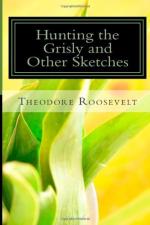In the cases mentioned above the grisly attacked only after having been itself assailed, or because it feared an assault, for itself or for its young. In the old days, however, it may almost be said that a grisly was more apt to attack than to flee. Lewis and Clarke and the early explorers who immediately succeeded them, as well as the first hunters and trappers, the “Rocky Mountain men” of the early decades of the present century, were repeatedly assailed in this manner; and not a few of the bear hunters of that period found that it was unnecessary to take much trouble about approaching their quarry, as the grisly was usually prompt to accept the challenge and to advance of its own accord, as soon as it discovered the foe. All this is changed now. Yet even at the present day an occasional vicious old bear may be found, in some far-off and little-trod fastness, which still keeps up the former habit of its kind. All old hunters have tales of this sort to relate, the prowess, cunning, strength, and ferocity of the grisly being favorite topics for camp-fire talk throughout the Rockies; but in most cases it is not safe to accept these stories without careful sifting.
Still it is just as unsafe to reject them all. One of my own cowboys was once attacked by a grisly, seemingly in pure wantonness. He was riding up a creek bottom and had just passed a clump of rose and bull-berry bushes when his horse gave such a leap as almost to unseat him, and then darted madly forward. Turning round in the saddle to his utter astonishment he saw a large bear galloping after him, at the horse’s heels. For a few jumps the race was close, then the horse drew away and the bear wheeled and went into a thicket of wild plums. The amazed and indignant cowboy, as soon as he could rein in his steed, drew his revolver and rode back to and around the thicket, endeavoring to provoke his late pursuer to come out and try conclusions on more equal terms; but prudent Ephraim had apparently repented of his freak of ferocious bravado, and declined to leave the secure shelter of the jungle.
Other attacks are of a much more explicable nature. Mr. Huffman, the photographer of Miles City, informed me once when butchering some slaughtered elk he was charged twice by a she-bear and two well-grown cubs. This was a piece of sheer bullying, undertaken solely with the purpose of driving away the man and feasting on the carcasses; for in each charge the three bears, after advancing with much blustering, roaring, and growling, halted just before coming to close quarters. In another instance a gentleman I once knew, a Mr. S. Carr was charged by a grisly from mere ill temper at being disturbed at mealtime. The man was riding up a valley; and the bear was at an elk carcass, near a clump of firs. As soon as it became aware of the approach of the horseman, while he was yet over a hundred yards distant, it jumped on the carcass, looked at him a moment, and then ran straight for him.




